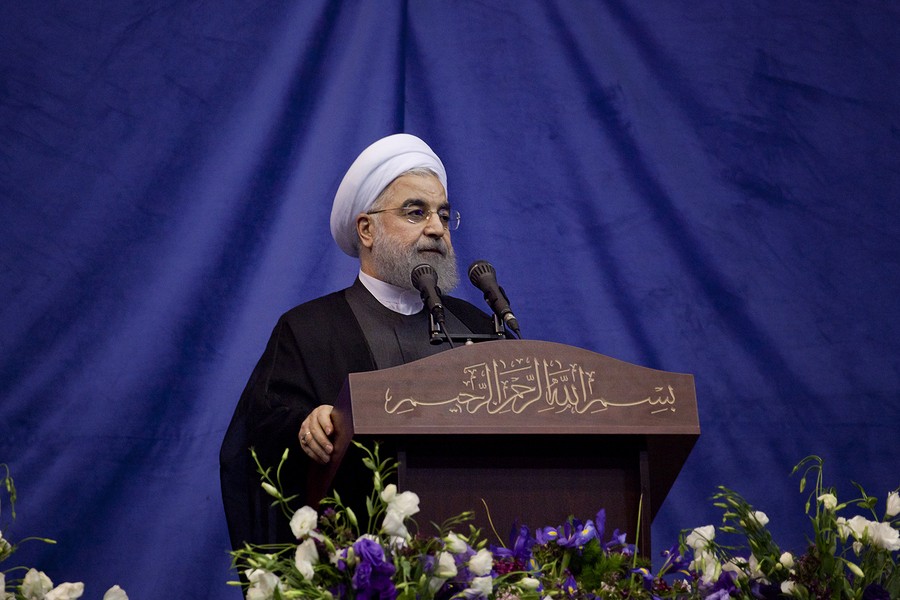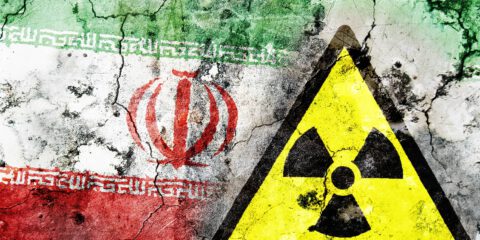No duplicitous decrees by supreme or smiling ayatollahs should deflect our attention from Tehran’s dangerous moves.
A new regional superpower structure was on display this week in Sochi, a city on the Black Sea coast that has become the de facto capital of the Middle East under Russian (and Iranian) dominance. The great winners of the war in Syria – Vladmir Putin of Russia, Hasan Rouhani of Iran, and Bashar Assad of Alawite Syria – clasped hands in a victory salute.
It was an abject symbol of the strategic malfeasance of the West, after almost a decade of Obama-led retreats.
It’s not clear whether President Trump intends to challenge Russian dominance in the region, nor how the US intends to stymie Iranian hegemonic ambitions and its drive for nuclear weaponry – despite Trump’s fine declarations in this regard. It isn’t clear how the US plans to work with regional actors to this end. Only concrete cooperation between Iran’s rivals and the US will make it possible to thwart Iran’s ambitions.
Urgently needed is a tough regional strategy to counter Iran’s rush for hegemony; an aggressive, anti-IRGC, anti-Assad, anti-Hezbollah policy; and a policy that dissuades Russia from providing cover to Iran.
Unfortunately, such hardheaded thinking seems to be in low supply. Instead, the music emerging from Western capitals, especially European ones, is more of the namby-pamby, wishful and weak-kneed claptrap that was the hallmark of the Obama years.
Instead of being branded a dangerous enemy and being called-out for their many aggressions, Iran is being courted for business and being extended the courtesies of diplomatic respect.
Take, for example, the question of Iran’s unbridled ballistic missile program. Iran is repeatedly selling the same “lockshen” (warmed-over fallacies) about restraints on their missiles to an easily- and willingly-duped West.
Israel’s top missile and missile defense expert, Uzi Rubin, published an expose this week of Iranian deception in this regard. (Rubin was founder and first director of the Israel Missile Defense Organization in the Israel Ministry of Defense, which developed, produced and deployed the Arrow missile system. He was twice awarded the Israel Defense Prize. He is now with the Jerusalem Institute for Strategic Studies).
In Rubin’s detailed analysis, it emerges that all types of Iran’s missiles – solid propellant ballistic missiles, liquid propellant ballistic missiles, and cruise missiles, each of great technological variability – miraculously and conveniently have exactly the same declared maximum range, right down to the last kilometer: 2,000 kilometers, according to Iranian avowals.
This is clearly impossible and patently false, Rubin proves. The range of Iran’s latest “Khorramshahr” ballistic missile (which is clearly a North Korean BM25 or a copy of it) is 3,500 km. So why the repeated Iranian assurances that they have capped their missiles at 2,000 km? Because this keeps Western Europe out of range. Two thousand kilometers is sufficient to threaten Israel, Saudi Arabia and Egypt, but not most EU countries.
Rubin says that Ayatollah Khamenei’s reported “decree” to cap the range of the “Khorramshahr” has about the same (negligible) value as Khamenei’s religious decree (fatwa) against development on nuclear weapons in Iran, issued when the UN sanctions were beginning to bite. “Both decrees were crafted with the intention of impressing diplomats and gullible commentators in Europe and the US regarding Iran’s good will, without tying Iran’s hands in the nuclear and ballistic missile arenas one iota.”
“The tendency to believe in products, people and policies that give a good feeling is the only possible explanation for the eagerness of some Western observers to ignore uncomfortable realities and accept statements of reassurance made by adversaries,” Rubin adds.
Worse still, by “selling” the same merchandize – range limitations – again and again to easy-to-fleece audiences in the West, Iran succeeded in de-linking their missile programs and nuclear programs, leading to the JCPOA – a dream deal for Iran.
A similar Iranian deception has been underway for four years with regard to the character and political program of Iranian President Hassan Rouhani. Rouhani was sold to the West as the darling of urban, secular-minded, middle class Iranians seeking freedoms and economic reform. The smiling Rouhani was then posted as the poster boy for the “great Iranian civilization” that would, according to the President Obama, come to play a “responsible role in the region” following the nuclear deal.
Here too, the branding of Rouhani as a moderate was mere propaganda meant to mollify willing-to-be-snookered European and American leaders. Four plus years later, none of Rouhani’s promised reforms have come to be. Iran is the same economically-backward and oppressive security state it was pre-Rouhani, while Iran’s aggressions beyond its borders have accelerated wildly.
To anybody with open eyes, this can’t be a major surprise. Rouhani oversaw a campaign of assassinations targeting dissidents at home and abroad when he headed Iran’s National Security Council, and he had a leading role in the merciless crackdown against the 1999 student uprising. He boasted back then how Iran managed to advance its nuclear program while hoodwinking the West.
Yet Rouhani is still being held up as a paragon of liberal sweetness by many unsceptical interlocutors in the West.
IT’S TIME FOR THE WEST to stop being so innocent and unsuspecting regarding Iran. Two years after the signing of the JCPOA, it can definitively determined that Iran wasn’t “incentivized by the nuclear accord to be less aggressive, less hostile, more cooperative, to operate the way we expect nations in the international community to behave” – as President Obama foolishly expected.
The opposite is true. Tehran is investing ever-great amounts of blood and treasure in realizing its aspirations for a Shiite corridor from the Persian Gulf to the Mediterranean Sea. It is prepping Hezbollah for the next big confrontation with Israel, supported by Iranian air and naval bases that may soon be built in Syria under Russian cover, and supported in future by an Iranian nuclear umbrella.
Iran is on the march, presenting a significant security challenge to Israel, to moderate Sunni countries, and to the West. No duplicitous decrees by supreme or smiling ayatollahs should deflect our attentions.
Published in The Jerusalem Post and Israel Hayom, November 24, 2017.
JISS Policy Papers are published through the generosity of the Greg Rosshandler Family.
photo: Bigstock








 - בניית אתרים
- בניית אתרים